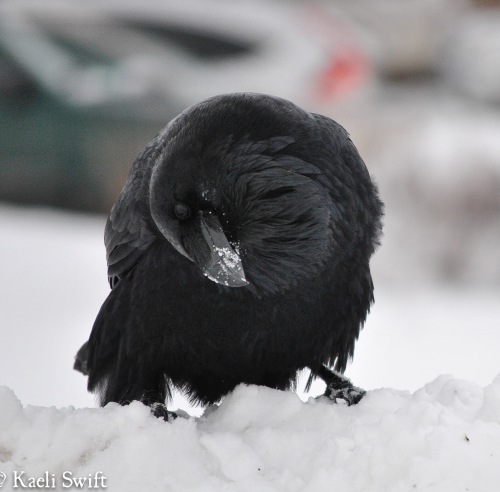…someone trying to steal my lunch. Turns out, humans are not the only ones wary of peeping Toms; new research shows raven can imagine being spied on by a competitor.

***
The other day my friend and I were having a very merry time at the thrift store when, without cause or provocation, this women decides to up and ruin our trip. Well really, she simply spotted the same gorgeous caste iron dutch oven that my friend wanted and reached it first, but the consequence was the same (it was a tragically beautiful dutch oven). This dynamic-my friend having her own intentions (to obtain and own that dutch oven for herself) and recognizing that this other women had her own intentions (to obtain and own that dutch oven for herself) is something so second nature to being human we rarely give it any thought. But the ability to attribute mental states to those around us is an incredibly profound and complex cognitive task. Understanding if this ability, called Theory of Mind, exists in other animals has been among our top interest as ethologists.
Like other corvids, ravens cache food and, as a consequence, run the risk of their caches being stolen by others. It has long been known that if ravens can see that they are being watched, they behave differently when it comes to caching than if they are alone. This is interesting, but doesn’t necessarily speak to whether they posses theory of mind because of the confounding effect of “gaze cues”. Basically, the correlation between head cues and competitor behavior make skeptics doubtful about non-human animals having the ability to know what others might be seeing. So raven master Thomas Bugnyar and his colleagues Reber & Bruckner recently published an elegant study to address just this issue.
By training captive ravens to look through a peephole, and then allowing them to cache food with the peephole opened or closed, the researchers were able to show that ravens behaved as if they were being watched when they could hear ravens and the hole was open, but not when they could hear ravens but the peephole was closed. What this suggests is that ravens are capable of remembering their own experience of looking through a peephole to see into another room, and can imagine that another bird might be doing the same thing even if they cannot see this bird.

Experimental set up. Bugnyar et al. 2016. Nature Communications
Theory of mind and imagination (which are not mutually exclusive) are the cornerstones of what makes for a powerful cognitive toolkit and have long been thought to be uniquely human. As we continue to build on the body of work showing non-human primates, corvids and some other animals posses some of the same skills we do, many will be challenged to redefine what it means to be human. Personally, framing the question that way doesn’t interest me. To me the more interesting question is not how are humans different from ravens, but how are we the same and why? What is it about being human and being raven that make possessing imagination important? Fortunately there is still loads more research to be done, and when it comes to teasing out this question I can only imagine the possibilities.
Literature cited:

